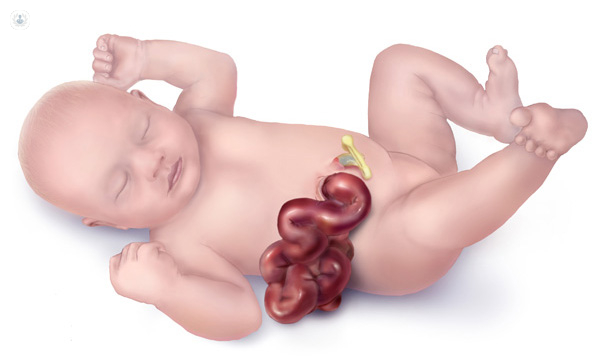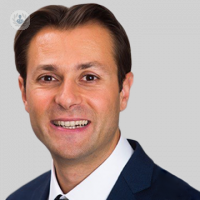Neonatal surgery: fixing congenital abnormalities
Escrito por:Newborns need surgery when they are born with congenital abnormalities. This means that some organs did not form in the right way before birth and there is a need to perform neonatal surgery to correct the anatomy to allow that organ to function properly. Mr Stefano Giuliani, an expert neonatal surgeon, explains why some newborn babies require surgery after birth.

What are the most common reasons a newborn might need surgery?
The most common conditions requiring surgery in the neonatal period are:
- Oesophageal atresia (the upper part of the oesophagus connects to a small pouch instead of the lower oesophagus and stomach)
- Congenital diaphragmatic hernia (failure of the diaphragm muscle to close during development, causing contents from the abdomen to move up into the chest cavity)
- Gastroschisis (abnormality of the abdominal wall in which the intestines are found outside the baby’s body)
- Omphalocele (a hole in the belly button causes abdominal organs to end up outside their body)
- Imperforate anus (the opening of the anus is missing or blocked)
- Hirschsprung’s disease (an intestinal blockage caused by the lack of movements in the last portion of the bowel)
- Intestinal atresia (blockage or obstruction in the intestine)
- Intestinal perforation (a hole or rupture in the intestines)
- Inguinal hernia (when abdominal organs come through the inguinal ring in the groin due to its failure to close properly during development)
- Hypertrophic pyloric stenosis (the acquired thickening of the valve at the end of the stomach causing projectile vomiting)
What are the risk factors? Are premature babies more likely to need surgery?
In general, consanguinity (blood relation) is the main risk factor for congenital abnormalities. This happens when the mother and father are related. Other risk factors, such as smoking and drug use during pregnancy, are associated with gastroschisis. Premature babies are at risk of developing an acute inflammation of their intestine (necrotising enterocolitis) that can require an operation, and, they also have a high incidence of inguinal hernias.
Is surgery always an emergency, or is it sometimes better to wait?
Surgery is not always an emergency. There are congenital abnormalities that require an operation within the first 24 hours of life (oesophageal atresia, gastroschisis, intestinal atresia etc.). For other conditions, it is possible to wait and see if the baby can get better without an operation (i.e. early stage necrotising enterocolitis).
Can any procedures be carried out before birth?
There are exciting advances in the field of foetal surgery. It is now possible to help babies affected by congenital diaphragmatic hernias by placing a small balloon in their windpipe when they are still in the womb. This balloon helps the lungs to develop and to function better after birth. Other common prenatal interventions are: drainage of abdominal and thoracic cysts, ligation of abnormal blood vessels and amniotic bands.


